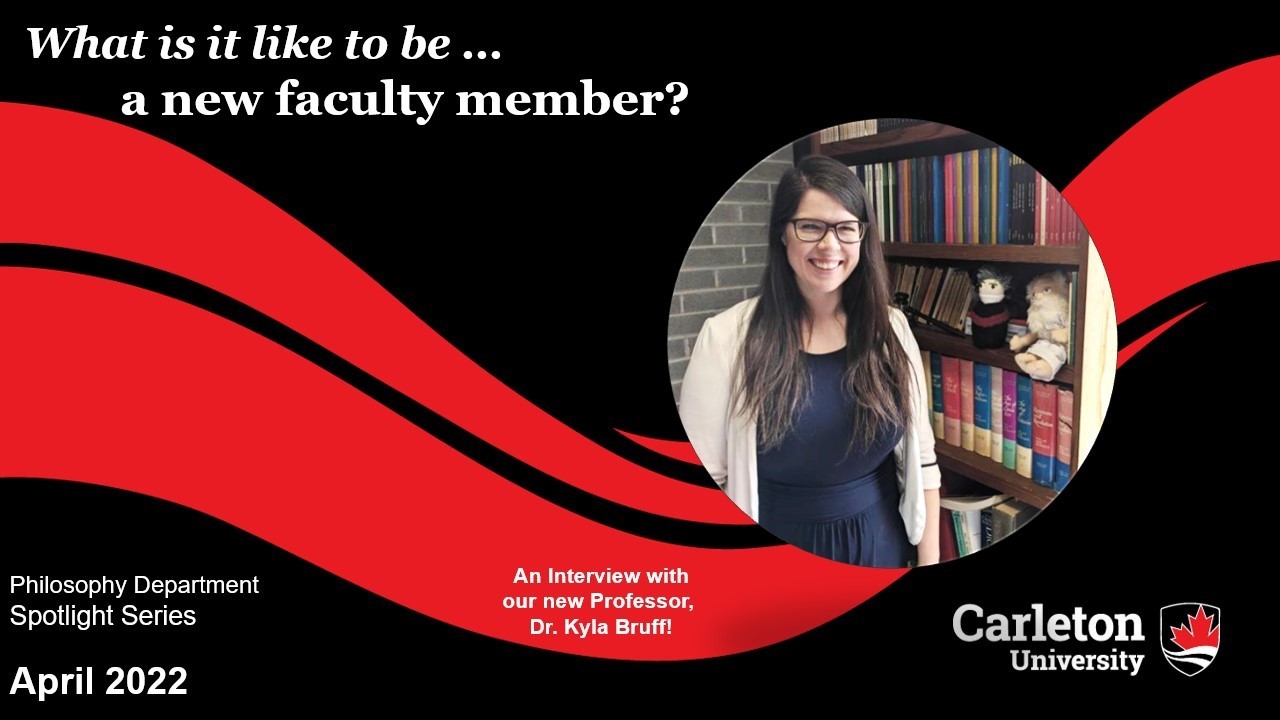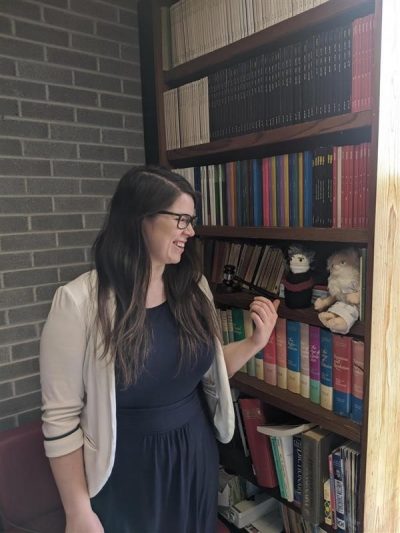What is it Like to be a New Faculty Member? An Interview With Prof. Kyla Bruff

Meet Assistant Professor Kyla Bruff!
Last summer, Kyla joined the Philosophy Department as a junior faculty member. As the end of the winter term approaches, we thought it was a good time to catch up with her and gather her thoughts on her first year at Carleton.
Kyla, you originally come from Newfoundland and your roots seem to matter a lot to you. But you are also bit of a cosmopolitan. You are a polyglot (you speak German, French, and Czech), and you have lived in several countries over the past decade. Now that you have taken up a long-term position, though, how does it feel to be settled in Ottawa?
Kyla Bruff: It feels fantastic to be settled in Ottawa as part of the Carleton community, sharing my passion for 19th and 20th century philosophy daily! The students and faculty here have all been so enthusiastic and supportive. I couldn’t have asked for a warmer welcome.
Settling in Ottawa felt natural to me, as I visited many times over the years. I presented at multiple conferences here during my PhD program, quickly discovering that Ottawa is a great hub for collaborative, interdisciplinary research across institutions. This is important to me as my research interests extend into the domains of political theory, environmental studies, and theology. Fun fact—in my teen years, I also visited Ottawa for a music festival as a jazz bassist and for a work convention as an electronics salesperson. Although Adorno may have changed my views on jazz and Marx on sales, my affection for Ottawa thankfully remained!
My hobbies have also found a home in Ottawa. I enjoy cycling to campus in the summer and skating in the winter. I also take pleasure in ordering my morning croissant in the Byward Market in French and speaking French with colleagues when possible! On top of that, I am taking a Czech course here offered by the local School Board. I am certainly no polyglot by European standards, but I try my best to keep up with my languages and to improve. Next on the Ottawa-to-do-list for me is to watch some live debates in the House of Commons and to find an ice hockey team.
We’ve all read blog posts about the struggles of young academics in a cruel job market. You must have read them as well. In such a climate, it is easy to become discouraged. As a successful candidate, what advice can you offer to graduate students hoping to have an academic career?
KB: I am very trepidatious about offering advice to anyone on this topic, as I know many individuals who are very deserving of an academic job, did all the right things, but haven’t yet been successful. There is definitely a “right fit, right time” element to success on the job market, and I am incredibly lucky that the job ad for the position at Carleton fit my academic profile so well.
While one person’s experience cannot be universalized, I can certainly share what worked for me. To be blunt, I followed my own path and ignored the advice that I should accept graduate admission offers I had from “higher profile schools” when the potential supervisors/research areas of these schools were not the right fit for me. This resulted in two unconventional decisions: I went to Europe to do my Masters and returned to my hometown, St. John’s, Newfoundland, to do my PhD. I pursued a combined PhD (co-tutelle) between Memorial University and the University of Freiburg, which allowed me to study in Germany under a second supervisor in the summer months. In my case, studying at a smaller school, like Memorial University, certainly did not pose an obstacle in my pursuit of a faculty position.
My general advice to a graduate student aiming for an academic job would be, first of all, to do things before you feel ready. Feeling completely ready to achieve academic milestones will likely never happen. Present underdeveloped ideas at conferences. Draft papers for publication at an early stage and get all the feedback you can. Send these papers out for review in journals or volumes before you feel ready! Apply for the dream job before you are ready (that’s what I did)!
My next suggestion would be to seek out a supportive supervisor. The number one reason I returned to Newfoundland was not homesickness, but to work with my fantastic supervisor, Dr. Sean McGrath. A great mentor can make all the difference for successfully finishing and defending your dissertation and helping you navigate academia. Finally—get involved with your community!!!
Your PhD dissertation was on Schelling’s political philosophy. Schelling is not the first philosopher that comes to mind when we think of the ‘great figures’ of the history of philosophy. He’s a bit of an underdog. Why Schelling? What do you find impressive about him as a philosopher? And just for laughs, is there one endearing or ridiculous anecdote you can share about Schelling?

KB: Schelling is a thinker who refuses to accept this world for what it appears to be. An early thinker of the unconscious, he suggests that at the core of that which appears as rational is the anarchic and chaotic. As an undergraduate, I was fascinated by the countless angles Schelling offered from which to analyze the fractures in the logical constitution of human experience, without thereby falling into irrationalism. Schelling also allowed me to dip my toes into theology as a young student wrestling with questions of death. He lost his beloved wife, Caroline, in 1810, and ventured to speculate on the connection between our localized, finite being in the world and the transcendent. He sees us as living in one particular time in history—a time which has an end and will eventually be superseded by something greater. The destiny of this history is, on Schelling’s account, like nothing we have ever experienced.
As Schelling’s life contained a great deal of tragedy, rifts (a major one with Hegel), and strife, it is no surprise that the funnier anecdotes in his biography are from his very young days as a student and roommate of Hölderlin and Hegel at the Tübingen seminary. The three students followed the early events of the French Revolution with enthusiasm, and legend has it that together they planted a tree in honour of liberty and danced around it, singing revolutionary songs! Schelling also got in trouble for translating the Marseillaise into German and read Rousseau under his bedcovers during that time. A powerful antidote to the conservative, strict atmosphere at the seminary!
German philosophy –especially German idealism– has the reputation of being obscure and very complicated! And yet, one striking thing about you is how you make philosophy clear, accessible, and relevant. You have a blog, you engage in public philosophy, etc. How do you make sense of this tension?! Is it hard work for you to make things clear, or does it just come to you naturally?
KB: Life is too short for the theses of German Idealism to be shrouded in obscurity or only accessible to the few! Honestly, it comes naturally to me to speak and write enthusiastically and in a comprehensible and frank, casual manner. Maybe that comes at the expense of finesse. In any case, it is super important to me to communicate ideas clearly, take on feedback, and work on being an effective educator. I have always bounced around journalism circles, publishing op-eds here and there, and I am a trained and qualified high school teacher. Maybe that has something to do with it. But it is also just my personality. I am a direct, loud, extroverted, honest person, who really enjoys communication and conversation! This sometimes involves taking risks, especially with the examples I use to illustrate ideas and the working hypotheses I put forth in my classes, but it’s worth it.
You have taught courses in several different places and institutions before you came to Carleton. Did you notice anything special about Carleton students? What type of research project do you hope to supervise?
KB: Most of the students I have taught at Carleton are already original thinkers in their own right. They are creative and engage with the philosophical material personally. They value Carleton’s commitment to creative teaching/learning methods and honest conversations about tough topics. Many come to office hours to chat, which is great!!
Overall, the readiness of students and faculty of different philosophical orientations to communicate with one another is something I really value about our department. Philosophy majors focusing on the philosophy of mind and in cognitive science have taken my courses and have found their own productive resonances with the material I teach. Students from Carleton’s Bachelor of Humanities program (with its curriculum of “Great Books”) have taught me and their fellow students in class about Boethius, Dante, the Upanishads … the list goes on!
In my graduate/advanced undergraduate seminar course, every student seminar presentation has been excellent. I have also enjoyed getting to know each student personally through our one-on-one discussions prior to each presentation. I am impressed and proud of the work they have produced!
I hope to supervise student projects in 19th and 20th century German and French philosophy, political and social philosophy, existentialism, romanticism, and environmental philosophy. I have a hunch that projects on Hegel or Schelling in social and political philosophy may be the first ones on the horizon!
Is there one or several projects that you feel especially excited about in the next couple of years? What do you see as your special contribution to the department and to Carleton, either in your teaching, research, or public engagement?
KB: I hope to make a meaningful contribution to the ongoing work on climate change at Carleton through my research in the philosophy of ecology and corresponding public engagement initiatives. I aim to do this work in my capacities both as a faculty member and Co-Director of the NGO For A New Earth (FANE). FANE has always focused on cultivating care for our common home through both local and global action, bringing together philosophy, science and art. I look forward to working with Carleton and the broader Ottawa community to help stage ecological discussions, events and initiatives, which could help bring awareness to issues of climate change while directly benefiting our community and local environment.
I am also excited to be teaching philosophy in the Lifelong Learning Program at Carleton starting this spring, as I feel strongly about making academic philosophy accessible to different groups of people.
Finally, I am looking forward to eventually publishing my research on competing concepts of civil society in the critical theory tradition, as well as continuing my research on populism and Adorno. For students interested in the critical theory of the Frankfurt School, I will be teaching a seminar on Adorno and Horkheimer’s Dialectic of Enlightenment next academic year.
Do you have a motto? If you were to share one proverb that speaks to you, what would it be?
KB: In view of the tragedy we are witnessing in Ukraine, and the struggle with normativity that comes in an arguably “post-truth” era, I will leave you with some Adorno:
“It would be advisable to think of progress in the crudest, most basic terms: that no one should go hungry anymore, that there should be no more torture, no more Auschwitz. Only then will the idea of progress be free from lies.”
And with that, let us say thank you to Professor Kyla Bruff for doing this interview with us and for being featured in our very first spotlight profile! Keep an eye out for our next spotlight article, to be published in May 2022.
Have something to share with the Carleton Philosophy community? Fill out our news submission form.
